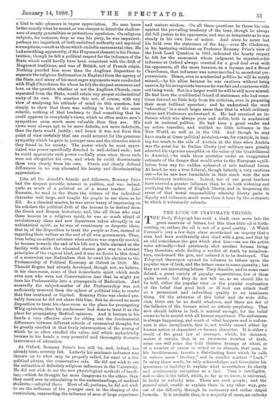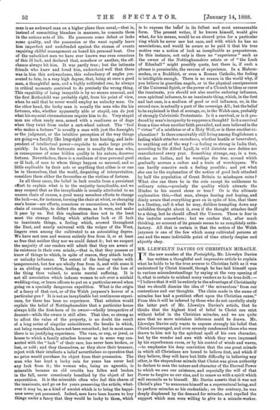THE LUCK OF INANIMATE THINGS.
THE Daily Telegraph has sunk a shaft once more into the great reservoir of letters, but this time little oil is forth- coming, or, rather, the oil is not of a good quality. A Welsh Coroner's jury a few days since ascertained on inquiry that a man had been accidentally shot dead with a gun, and that by an odd coincidence the gun which shot him—we use the active voice advisedly—had previously shot another human being. They therefore, while finding a verdict of death by misadven- ture, condemned the gun, and ordered it to be destroyed. The Telegraph thereupon opened its columns to letters upon the popular view of luck, and the letters came in some quantity ; but they are not interesting letters. They describe, and in some cases defend, a great variety of popular superstitions, few of them quite novel ; but they do not tell us, as we should like to be told, either the popular view or the popular explanation of the belief that good luck or ill luck can attach itself as a permanent and indwelling quality to an inanimate thing. Of the existence of this belief and its wide diffu- sion, there can be no doubt whatever, and there are few of the fallacies of the human mind so utterly perplexing. That men should believe in luck, is natural enough, for the belief seems to be in accord with all human experience. The unforeseen is always happening, and much of what happens and is unfore- seen is also inexplicable, that is, not visibly caused either by human action or dependent on human character. It is either a result of the great law of averages, which, for instance, makes it certain that in an enormous number of deals, some one will some day hold thirteen trumps at whist, or of a number of causes so mixed or so obscure, that man, in his bewilderment, invents a distributing force which he calls in serious cases "Destiny," and in smaller matters "Luck." In using those words, he only acknowledges and formulates his ignorance, or inability to explain what nevertheless he clearly and continuously recognises as a fact. That is intelligible, and so also is the belief, which, so far as we know, is universal, in lucky or unlucky men. There are such people ; and the general mind, unable to explain them in any other way, gets out of the difficulty through its customary and rather stupid formula. It is probable that, in a majority of cases, an unlucky man is an awkward man on a higher plane than usual,—that is, inatead of committing blunders in manners, he commits them in the serious acts of life. He possesses some defect or lacks some quality, and the possession or the want equally leave him imperfect and undefended against the stream of events requiring skilful management on board his personal boat. One of the unluckiest men we have ever known was even conscious of this ill luck, and declared that, somehow or another, the off- chance always hit him. It was partly true ; but the intimate .friends who knew and loved him, understood well that there was in him this awkwardness, this redundancy of angles pre- sented to fate, in a very high degree, that, being at once a good man, a thoughtful man, and a highly cultivated one, he always in critical moments contrived to do precisely the wrong thing. This capability of being incapable is by no means unusual, and the first Rothschild was probably right, from his point of view, when he said that he never would employ an unlucky man. On the other hand, the lucky man is usually the man who fits his fortunes, who, whether apparently able or stupid, can do just what his especial circumstances require him to do. Very stupid men are often ready men, armed with a readiness as of dogs when they twist from under a cart-wheel unhurt. The "fool who makes a fortune" is usually a man with just the foresight, or the judgment, or the intuitive perception of the way things are going—a faculty like long-sight or keen hearing, and inde- pendent of intellectual power—requisite to make large profits quickly. In fact, the fortunate man is usually the man who, in consequence of some hidden quality in his nature, deserves fortune. Nevertheless, there is a residuum of true personal good or ill luck, of men to whom things happen so unusual, and so little explicable by their acts or anything that either is or can be in themselves, that the world, despairing of interpretation, considers them either the favourites or the victims of fortune.
In all these cases, the belief in luck results from a persistent effort to explain what is to the majority inexplicable, and we may suspect that as the inexplicable is usually attributed to an unseen chain of causes, a good many senseless efforts to change the luck—as, for instance, turning the chair at whist, or changing one's house—are efforts, conscious or unconscious, to break the chain of causality, to deflect the stream, as it were, and make it pass by us. But this explanation does not in the least meet the strange feeling which attaches luck or ill luck to inanimate things, a feeling which, avowed throughout the East, and nearly universal with the vulgar of the West, lingers even among the cultivated to an astonishing degree. We have met men and women entirely free from it, or at least so free that neither they nor we could detect it ; but we suspect the majority of our readers will admit that they are aware of its existence in their own minds,—that is, that they possess or know of things to which, in spite of reason, they attach lucky or unlucky influence. The extent of the feeling varies with -temperament, but few are wholly free from it, and with some it is an abiding conviction, leading, in the ease of the loss of the thing thus valued, to acute mental suffering. It is not all association which induces women to sob over a mislaid
• wedding-ring, or brave officers to put on a particular sword when going on a specially dangerous expedition. What is the origin of a fancy of that sort, or of the Welsh jurymen's horror of a particular gun? It is not an inexplicable but continuous experi- ence, for there has been no experience. That solution would -explain the belief of Nottinghamshire that a particular house always kills the first-born of its owner—wholly irrespective of descent—while the owner is still alive. That idea, so strong as to affect the value of the property, is no doubt the result • of a long series of singular coincidences, the breaks in which, mot being remarkable, have not been remarked; but in most cases there is no justifying experience. The vase, or cup, or jewel, or house to which a family attaches honour as in some way con- nected with the " luck " of their race, has never been broken, or lost, or sold ; and they themselves, as they show their treasure, reject with their intellects a belief nevertheless so operative that no price would purchase its object from their possession. The man who has kept a lucky coin for years has never had -any luck from it ; the woman who, being an agnostic, is miserable because an old crucifix has fallen and broken in the fall, never consciously benefited by the object of her superstition. It is the miserable often who feel this charm of the inanimate, and go on for years preserving the article, what- ever it may be, as a kind of amulet which is to bring the happi- ness never yet possessed. Indeed, men have been known to buy things under a fancy that they would be lucky to them, which
is to express the befief in its fullest and most unreasonable form. The present writer, if he knows himself, would give what, for his means, would be an absurd price for a particular ring which he never saw but once, and with which he has no associations, and would be aware as he paid it that his true motive was a notion of luck as inexplicable as preposterous. In this instance, not only is there no " experience " such as the owner of the Nottinghamshire estate or of "the Luck of Edenhall" might possibly quote, but there is, if such a phrase is permissible, the reverse of experience. In a Mahom- medan, or a Buddhist, or even a Roman Catholic, the feeling is intelligible enough. There is no reason in the world why, if you believe in guardian angels, or in the physical omnipresence of the Universal Spirit, or the power of a Church to bless or curse the inanimate, you should not also ascribe enduring influence, even spiritual influence, to an inanimate thing, which, in the first and last case, is a medium of good or evil influence, or, in the second case, is actually a part of the sovereign All ; but the belief to be explained is that of average, or, in the Welsh case, probably of strongly Calvinistic Protestants. Is it a survival, or is it pro- duced by man's incapacity to suppress a thought? Is it a survival from a time when another faith prevailed, and men believed in the " virtue " of a mistletoe or of a Holy Well, or is there another ex- planation? Is there conceivably still living among Englishmen a feeling which attaches sacredness, whether hostile or benevolent, to anything out of the way ?—a feeling so strong in India that, according to Sir Alfred Lyall, in wild districts new deities are manufactured every year. Something strange, say, in a tree, strikes an Indian, and he worships the tree, around which gradually accrues a cultus and a train of worshippers. We can hardly conceive such a feeling possible ; and yet what else can be the explanation of the notion of good luck attached by half the population of Great Britain to misshapen coins? What else can there be in the coin except its unlikeness to ordinary coins,—precisely the quality which attracts the Hindoo to his sacred stone or tree ? Or is the ultimate explanation this,—that man, always fearing and hoping, and dimly aware that everything goes on in spite of him, that there is a Destiny, call it what he may, dislikes trampling down any unbidden thought about it, even if the thought attaches itself to a thing, lest he should offend the Unseen. There is fear in the impulse somewhere ; but we confess that, after much thinking, no account of its genesis seems to us completely satis- factory. All that is certain is that the notion of the Welsh jurymen is one of the few which many cultivated persons at one and the same indivisible point of time utterly despise and abjectly obey.







































 Previous page
Previous page